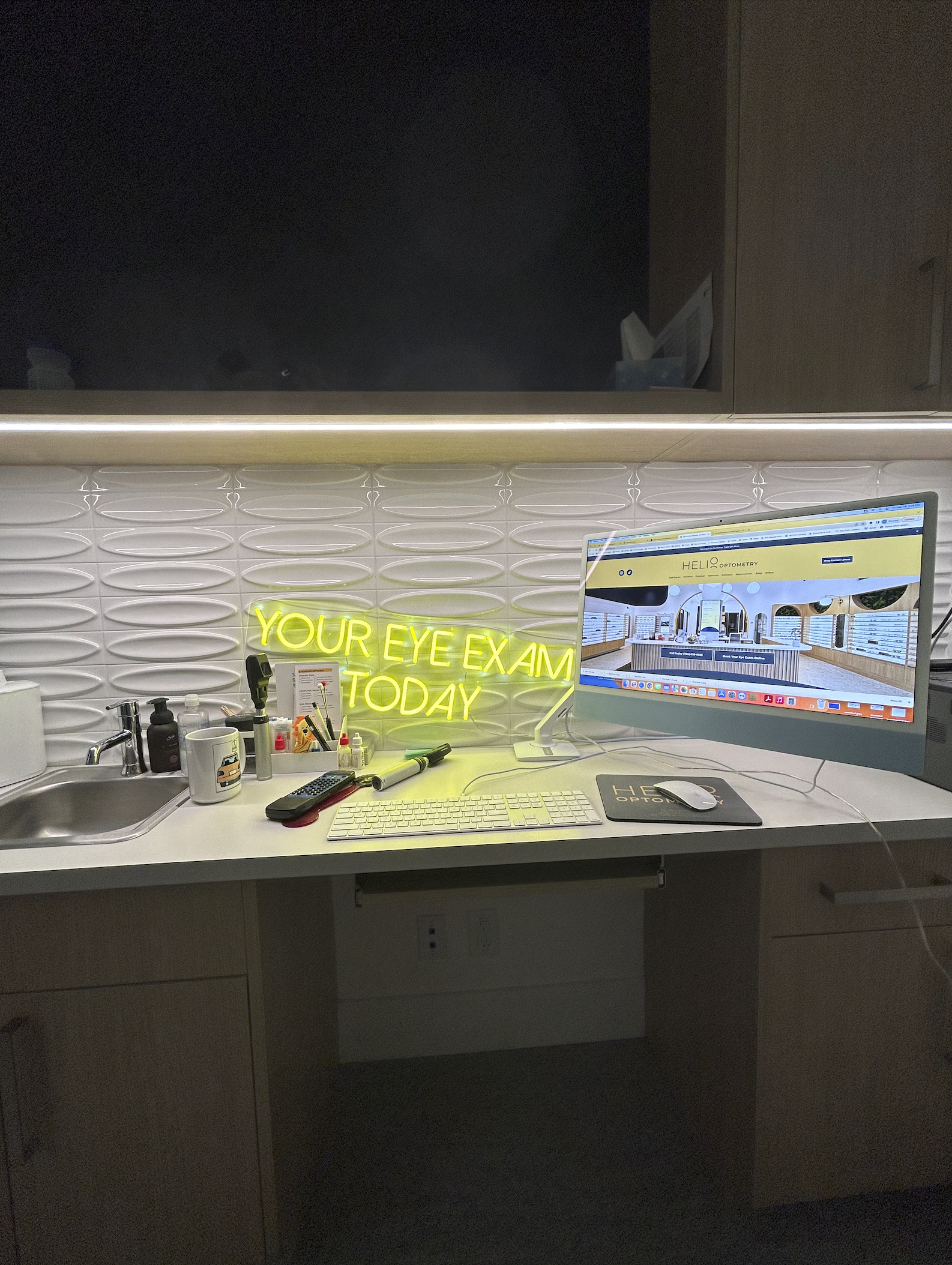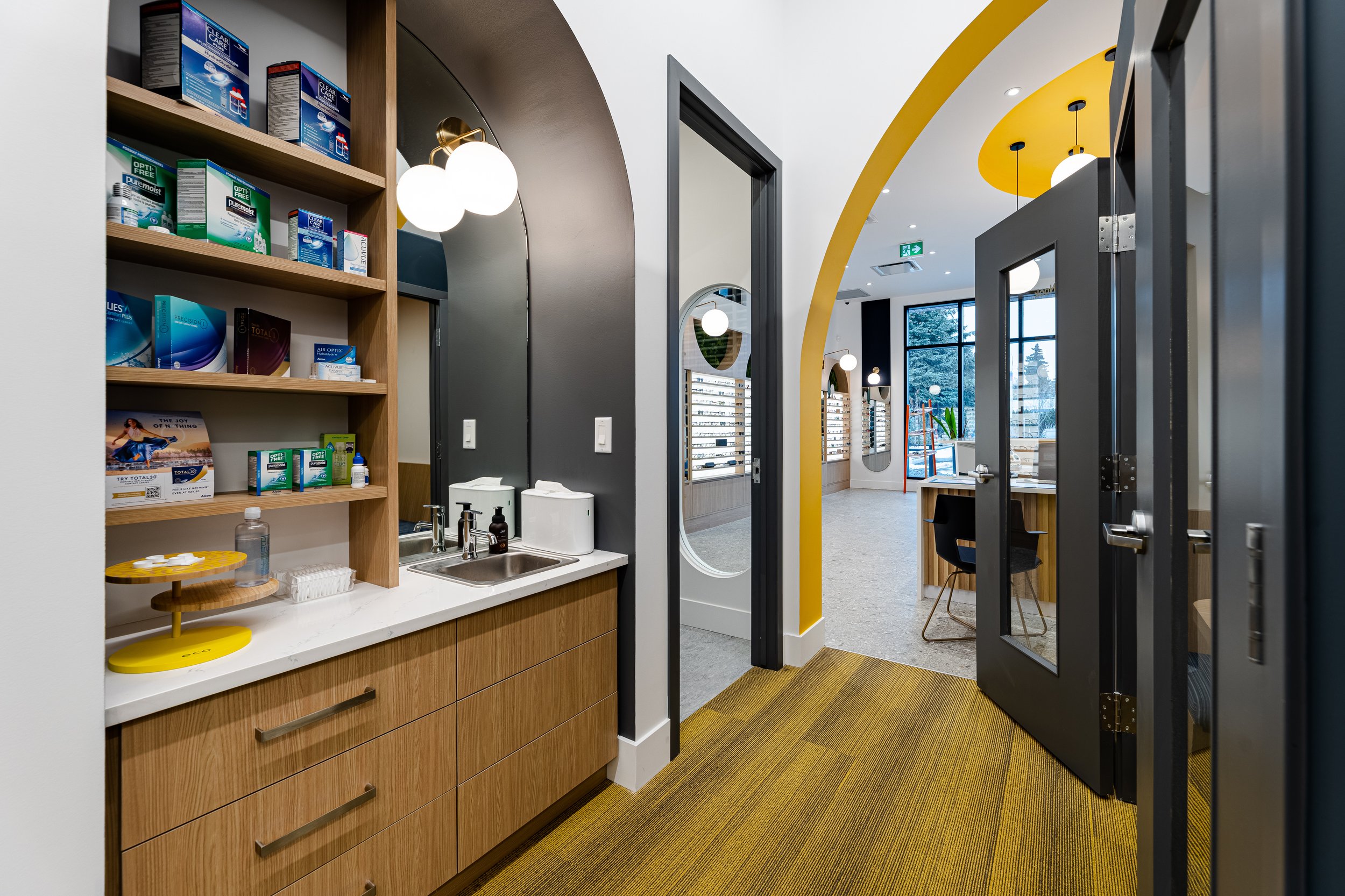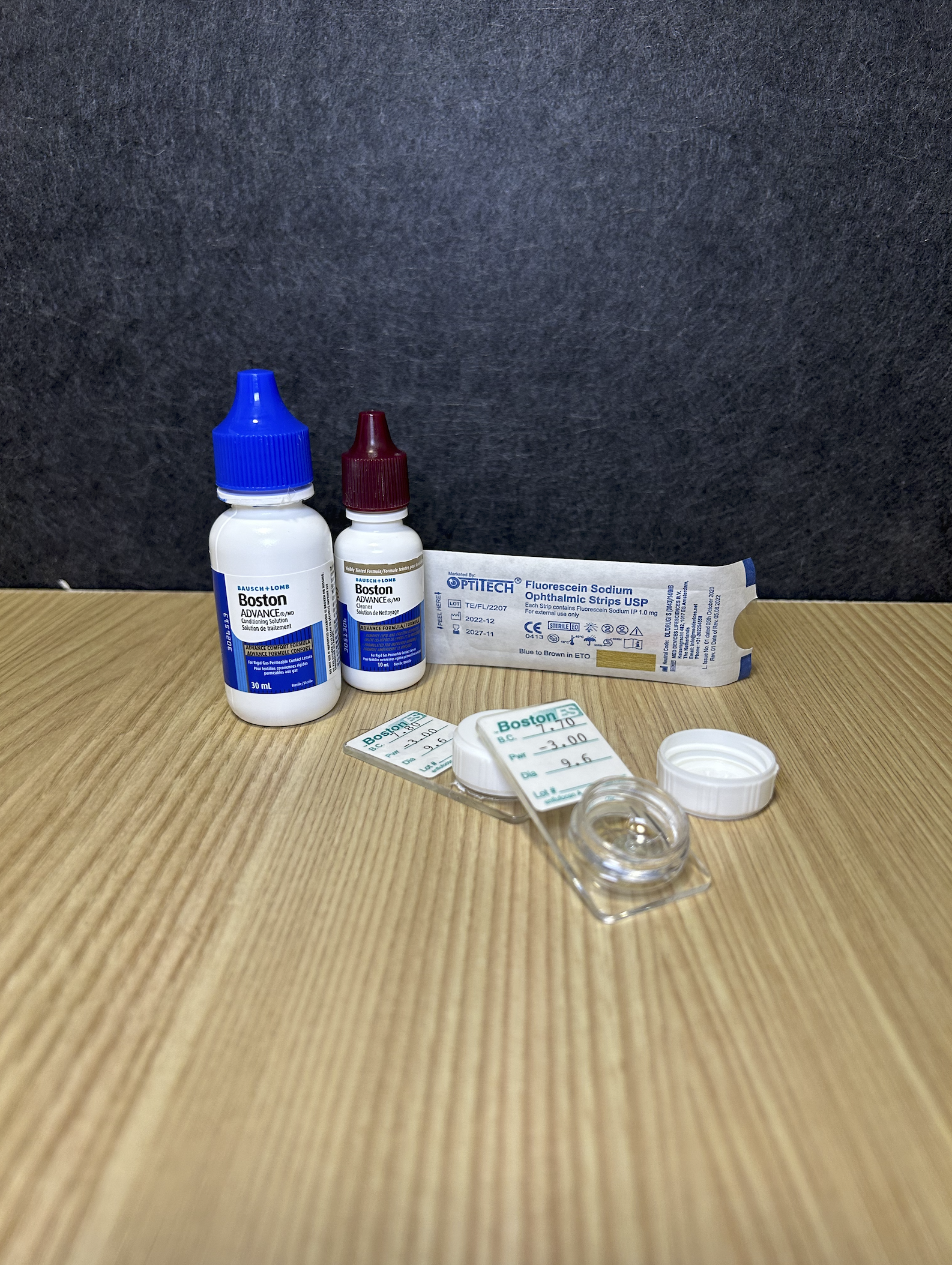
Rigid Gas Permeable Contact Lenses at Helio Optometry Eye Care Clinic in Edmonton.
Custom Made Hard Contact Lenses.
Costs associated with a specialty contact lens fitting or the lenses themselves may be covered in part by your third party insurance or a health spending account.
RGP Contact Lenses.
A rigid gas permeable (RGP) contact lens is a type of contact lens that is made from a specialized silicone material. Unlike soft contact lenses that are flexible, RGP lenses maintain their shape on the eye.
RGP lenses provide excellent visual clarity because of their rigid nature, which helps to correct various refractive errors such as nearsightedness, farsightedness, and astigmatism. RGP lenses are especially useful for patients with high prescriptions or large amounts of astigmatism.
RGP lenses are custom-made to fit the unique shape of your eye, providing a more personalized and precise vision correction.
Who Is This For?
Rigid gas permeable (RGP) contact lenses are an excellent option for many types of patients, including those who have been previously unsuccessful with soft contact lenses. Some characteristics of a good candidate for RGP lenses include:
Astigmatism: RGP lenses can effectively correct astigmatism, which is a common refractive error where the cornea has an irregular shape.
Strong prescription: RGP lenses can correct higher levels of nearsightedness or farsightedness compared to soft contact lenses. If you have a strong prescription, RGP lenses may be a better option for achieving optimal vision correction.
Irregular corneas: RGP lenses are often recommended for individuals with irregular corneas, such as those with keratoconus, a condition where the cornea becomes thin and bulges forward. RGP lenses can help to create a smooth and regular optical surface, improving vision for such individuals.
Long-term lens wear: RGP lenses are known for their durability and longer lifespan compared to soft lenses. If you prefer wearing contact lenses for extended periods or want lenses that require less frequent replacement, RGP lenses may be a suitable option.
It's important to note that each individual's eye health and specific needs are unique. The best way to determine if you are a good candidate for RGP lenses is at your comprehensive eye examination.
Where Do We Start?
The process of determining if you are a good candidate for rigid gas permeable (RGP) contact lenses begins with a routine eye examination. Your optometrist not only helps you achieve your best possible visual acuity but also carefully assesses the health of your eyes. If anything comes up during the eye examination that suggests RGP contact lenses would be beneficial, we will have a detailed discussion about all the available options.
Many patients are already aware that they have a corneal condition and have been frustrated by their inability to achieve clear vision with glasses or standard contact lenses. Frequently, these patients have been advised to accept their visual condition without realizing that there are other options available to improve their vision.
In some cases, patients who are being treated by an ophthalmologist or corneal specialist may be referred to our clinic for a fitting of specialty contact lenses, such as RGP lenses. This referral commonly occurs after successful eye surgeries like corneal transplant or corneal cross linking procedures.
The Fitting Process.
During the initial fitting appointment, your optometrist will select several diagnostic lenses to place on your eye. This is done to determine the best fitting arrangement that optimizes both vision and comfort. Once the best fit is determined, the prescription can be finalized, and a custom-made lens specific to your eyes can be ordered.
Typically this final customized lens will immediately provide you crisp, clear vision and all day wearing comfort. Occasionally, with more complicated corneas and prescriptions we may need to make an adjustment to the contact lens design which may take an additional appointment.
Our specialty RGP and Scleral lenses are all manufactured locally at Viscon contact lenses in Edmonton.
If you are new to contact lenses, we will train you on how to apply, remove, and care for your RGP lenses. This process differs slightly from the procedures used for traditional soft contact lenses due to the size and fitting characteristics of scleral lenses. With the guidance of our expert contact lens trainers, most patients are able to master this process after spending approximately an hour.
SCHEDULE YOUR SPECIALTY RIGID GAS PERMEABLE CONTACT LENS FITTING AT HELIO OPTOMETRY IN EDMONTON.
RGP contact lenses are a convenient way to get you seeing your best, glasses free. At Helio Optometry we routinely fit custom contact lenses on patients with high prescription, keratoconus and other corneal problems. Book an appointment online today. See you soon!
FAQ: Custom Fit Scleral Contact Lenses At
Helio Optometry in Edmonton.
-
Rigid Gas Permeable contact lenses when correctly fit, float on a thin layer of tears on the front surface of the eye (the cornea). Because they sit directly on the front surface of the eye, they are able to compensate for almost all prescriptions and any irregularities cause by corneal conditions such as keratoconus.
-
RGP contact lenses are most commonly 9.2 mm in diameter. Although RGP lenses can be made slightly larger or smaller depending on what is required to get the best fitting lens possible. This is slightly smaller than the average soft contact lens and about half the size of a penny.
-
Putting on and removing your RGP contact lenses is very similar to using a soft contact lens. Most people are able to become proficient at using their RGP’s in under an hour while training with on of our expert contact lens trainers.
-
Absolutely! If the lenses are fit correctly, RGP’s should be as a well fitting soft contact lens.
There is generally a break in period that lasts 3-4 days where you may experience a certain amount of lens awareness on the eye. But this goes away.
-
The care instructions are very similar to soft contact lenses. We recommend Boston Multipurpose solution and the use of ClearCare (hydrogen peroxide) for removing deposits occasionally.
-
Yes. Having a set of glasses in case of emergency is the recommendation.
We understand things happen. Contact lenses get lost or misplaced and it’s important to have some way to correct your vision. Our Aperture collection was design just for this.
How to Prepare for Your Eye Exam and Contact Lens Fit.
Get the most out of your eye exam by preparing for your visit.
-
Knowing your old prescription in your eyeglasses or sunglasses helps us to determine how much change your eyes are experiencing. This is important when managing some eye conditions.
-
If you love or hate your contact lenses, bring your current boxes. This way we can ensure that we can keep you in what you like, or find something that will work better.
-
Bring your insurance cards, government issued photo-Id like a drivers license, as well as your Alberta Health Care card. In order to provide services or bill your insurance, we need to be able to verify your identity.
-
Many health conditions can affect your vision. Knowing your medications can help us to better monitor your eye health. Medications for conditions such as diabetes, hypertension, cholesterol, arthritis, asthma, autoimmune, anti-depressants, and allergies are only some of the conditions we monitor and treat.
-
Most eye exams take about 20-30 minutes to complete, but can last up to 1-hour if we need to dilate your eyes and run additional tests. If new eyeglasses are prescribed we suggest you allow for another 30-minutes to find something that you love, as well as have our optical team take all the appropriate measurements to accurately fill your new prescription.
-
Eye exams are important to your overall health. It’s generally recommended that you have an eye test annually. Your optometrist may recommend a longer interval, depending on your age and risk factors.
-
Maybe. We don’t routinely dilate everyone, because we use optomap retinal photography which provides us with a 200-degree image of the inside of the eye. Certain medical like diabetes, cataracts, and glaucoma or vision conditions still require us to dilate your eyes. Your optometrist will notify you before instilling any eye drops.





